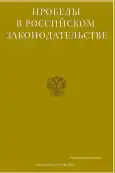The Legal Understanding of Bruno Leoni (On the 110th Anniversary of His Birth)
- Authors: Kiryukhin V.V.1
-
Affiliations:
- Academy of Management of the Ministry of Internal Affairs of Russia
- Issue: Vol 16, No 3 (2023)
- Pages: 47-52
- Section: Theoretical and Historical Legal Sciences
- URL: https://journals.eco-vector.com/2072-3164/article/view/568778
- EDN: https://elibrary.ru/BYGSON
- ID: 568778
Cite item
Abstract
Due to the change of the ideological paradigm in the post-Soviet period, the issues of methodology of the theory and history of law have acquired a new sound, involving researchers in numerous discussions. At the same time, legal positivism, recognizing only the norms of positive law as legal, directly linking the latter with the institution of the state, still dominates domestic legal science. It has to be stated that positivism actually ignores the complex foundation under the institution of law, which appears as if from oblivion. The methodology of studying the genesis of law beyond the boundaries of the positivist paradigm in Russian jurisprudence is not the strongest trump card. Because of this, the author draws the reader to the work of the Italian philosopher, anti-fascist, scientist, lawyer Bruno Leoni (1913-1967), who had a significant influence on the development of philosophical and legal views of the XX century. Basing and developing his concept of legal understanding on the postulates of Roman law, the views of representatives of different generations of the Austrian school of economic theory, Bruno Leoni made one of the most reasonable and successful attempts to resist the dominance of G. Kelsen’s normativism in European legal thought.
The purpose of writing a research paper is to understand the author’s creative heritage of Bruno Leoni, to determine the place of his scientific ideas in the legal worldview of the XX century, to draw attention to the productive foundations of his methodology in the study of law.
The main method used in writing the work is the dialectical method of cognition of the surrounding reality. In addition, when writing the work, the author used a number of general and special methods of scientific cognition: analysis, synthesis, induction, deduction, historical, comparative legal, formal legal and other methods of scientific cognition.
The conclusions obtained in the course of the study suggest that the interest in the creative heritage of Bruno Leoni will contribute to the further understanding and development of scientific ideas in the field of jurisprudence, philosophy and economics.
Full Text
About the authors
Vladimir V. Kiryukhin
Academy of Management of the Ministry of Internal Affairs of Russia
Author for correspondence.
Email: vlad19730706@rambler.ru
Cand. Sci.(Law), Associate Professor, Аssociate Professor at the Department of Management of Public Order Service in Protection`s Provision Centre for Command Staff Trainings
Russian Federation, MoscowReferences
- Isaev I.A. Solidarity as an imaginary political and legal state // Isaev I.A. Selected works: in 4 volumes. – M.: Prospect, 2020.
- Kelzen G. Pure doctrine of law. 2nd ed. / translated from German by M.V. Antonov and S.V. Lezov. – St. Petersburg: Alef-Press Publishing House, LLC, 2015.
- Leonie B. Law and Politics / Bruno Leonie; translated from the English by V. Koshkin, edited by A. Kuryaev. – M.: IRISEN, 2021.
- Leonie B. Freedom and the law / Bruno Leonie; translated from the English by V. Koshkin, edited by A. Kuryaev. – M.: IRISEN, 2021. 308 p. (Series «Law»).
- Cubeddu R., Friedrich A. von Hayek e Bruno Leoni // Politico. 1992. LVII, pp. 393-420.
- Menger С. Untersuchungen über die Methode der Socialwissenschaften und der Politischen Ökonomie insbesondere. – Leipzig: Duncker & Humblot, 1883. 338 р.
- Soto J. H. Socialismo, cálculo económico y función empresarial. 4.ª ed. Unión Editorial. – Madrid, 2010, pp. 156-157.
Supplementary files











